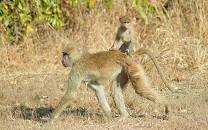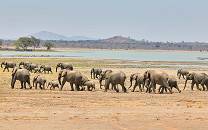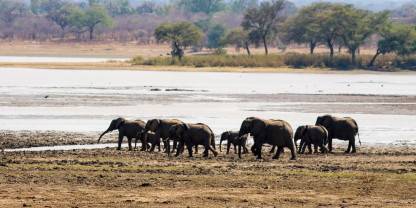Vwaza Marsh Wildlife Reserve is an underrated and accessible reserve bordering Zambia’s well-known Luangwa Valley. Wildlife numbers are relatively low due to poaching, but elephant, buffalo and leopard are resident, while lions occasionally wander across from Zambia. Situated at the park entrance, on the way to Nyika National Park, Lake Kazuni is home to 300-odd hippos and is visited daily by elephants.

-
Best Time To Go
- July to October (The bush is dry; animals are around the lake)
-
High Season
- July to October (Though the reserve never gets busy)
-
Size
- 960km² / 371mi²
-
Altitude
-
1,091-1,572m /3,579-5,157ft
 View Photos
View Photos
 View Photos
+4
Photos
View Photos
+4
Photos
Pros & Cons
- Large numbers of elephant, hippo and other wildlife at Lake Kazuni
- Four of the Big Five present (no rhino)
- and available
- Very accessible and easily combined with nearby Nyika National Park
- Campsite at Lake Kazuni and cheap accommodations in the nearby town of Rumphi
- Roads and amenities likely to improve following the signing of a co-management agreement with Peace Parks in 2023
- Lake Kazuni accessible by public transport
- No upmarket accommodations inside or close to the reserve
- 4x4 vehicle needed after rain
- Predators rare and hard to spot
Wildlife
Vwaza Marsh’s varied wildlife includes four of the Big Five (no rhino). Hippos and waterbirds are abundant at Lake Kazuni. Herds of buffalo and elephant come to drink at the lake several times a day, most numerously in the Dry season (May to October). The most common antelope is the puku, but greater kudu, bushbuck, roan and sable antelope, Lichtenstein’s hartebeest and impala are also present. Spotted hyena sometimes call at night, but leopards and lions are seldom heard or seen.
More about Vwaza Marsh’s wildlifeScenery
Most of the reserve comprises dense and . Scenic Lake Kazuni, a magnet for animals, stands alongside the main park entrance and is the site of the only formal campsite. The lake is surrounded by low hills and woodland. The vast area of marshland for which the reserve is named lies in a relatively inaccessible part of the northeast.
Activities
The main focal point for activities is Lake Kazuni. Here you can watch wildlife come down to drink from the campsite, enjoy the prolific birdlife, or arrange a with a ranger. are currently limited to a short road circuit that becomes largely inaccessible in the rainy season. However, there are plans to expand this network significantly under the co-management of Peace Parks.
Weather & Climate
Vwaza Marsh WR has a warm climate with a Dry season (May to October) and a Wet season (November to April). The Dry season months of May to August are cooler, and early mornings can be nippy. Temperatures rise in September and peak in October before the Wet season starts in November. December to March are the wettest months, and spectacular thunderstorms are not uncommon.
More about the weather and climateBest Time To Visit
The best time to visit Vwaza Marsh is from July to October, during the middle and end of the Dry season. This is when animals tend to stay near the lake in front of the camp, which is accessible to visitors on foot and by car. The Wet season (November to April) is great for birding, and the landscape becomes lush after the rains. However, roads tend to become impassable from December onward.
More about the best time to visit
